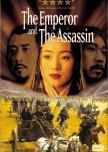
The Emperor and the Assassin
4 oamenii au considerat această recenzie utilă
Această recenzie poate conține spoilere
Gong Li’s Lady Zhou was the linchpin between the man who would become China’s first emperor and the assassin who would try to exterminate him. The Emperor and the Assassin is a nearly three hour epic tale of Ying Zheng’s tribulations, some self-created, as he faced the last two states of Zhou and Yan in his bid to unite the states by virtue of annihilating them in battle. He also faced coup attempts from within.
The film was divided into chapters, some more captivating than others. There were times the story meandered and slowed to a lull, others dealt with deadly secrets, battles, and changing loyalties. Even though there were emotional performances by the main actors I found I never cared enough about them as they faced dire consequences.
Gong Li was ethereal as Lady Zhou, the childhood friend and stabilizing force on the emperor who had to come to grips with his increasingly murderous and unstable behavior. Li Xue Jian‘s performance as the emperor came across as more emotionally unhinged than conflicted. Zhang Feng Yi‘s nuanced performance as the stoic assassin had just the right amount of gravitas. Some of the side characters, like Xue Jian’s Ying came across as overwrought.
The sets were high caliber and grand. The costumes tended more toward rustic materials for the majority of characters befitting the ancient times. Numerous extras and war equipment gave the battles a realistic look. The only complaints I have about the cinematography were the harsh yellow casts for most of the film with only a few scenes using strong blue filters to break it up. Lots of smoky backgrounds with the yellow filters tended to wash everything and one out. The editing could be choppy as well in places.
I will leave it up to others to judge the historical correctness the film portrayed. As a work of art it was entertaining for the most part even though I never connected emotionally with any of the characters. The story felt stronger when Gong Li was on screen and weaker when the emperor was weeping and gnashing his teeth. There was enough treachery, angst, and mass deaths to keep it interesting if not emotionally compelling.
Considerați utilă această recenzie?

Această recenzie poate conține spoilere
It’s not easy to be a nobody
In the martial arts world being #1 means a relentless road to the Death Duel. Whatever you are ranked someone is waiting in the wings to knock you off by any means necessary to move up.The Third Master of the Supreme Sword tired of the daily challenges and blood on his sword and went into hiding as menial labor in a brothel. Nicknamed Hopeless Ah Chi, he and the prostitute Hsiao Li, fell quietly in love but he left after a confrontation with rowdy customers. Coincidentally, Li’s brother and mother took him in. Eventually, she finds him at their home and it looks like for a while Ah Chi can live the contented life of a nobody.
Being that it’s a martial arts movie there are all sorts of people who want a piece of him when rumor spreads that his death notice was premature. Famed swordsman Yen Shih San is determined to know once and for all who is #1. But he will have to get in line as evil clanswoman Chiu Ti wants revenge for The Third Master spurning her.
The body count in Death Duel is staggeringly high. Almost no one is left standing by the end of the movie. Tang Chia’s fights are well done for the time. Most of the fights were filmed at a distance whether for artistic reasons or to cover the use of the stuntmen. I prefer to see the faces of the fighters though that didn’t happen often.
Lo Lieh as his Killer Clans character and Ti Lung in his Magic Blade costume made cameo appearances and showed the young Derek Yee what stage presence means. David Chiang made a cameo near the end of the film as a mad swordsman and Yueh Hua dropped in as an evil doctor. Ku Feng played against type and was the kindly brother of Ah Chi’s love interest. The movie was full of familiar kung fu faces. Yee did an admirable job as the lone swordsman who wanted to be left alone. Ling Yun didn’t have much screen time as the rival but made the best of it.
The movie was filmed on the lot but the settings were all quiet nice and didn’t look like they were meant to be torn down by marauding fighters. The OST fit the mood of the scenes and was quite lovely in comparison to others of the time. The Shaw Brothers’ gold lame costumes made an appearance though most of the costumes were more understated.
The huge cast could be overwhelming at times as fighters appeared out of nowhere to challenge The Third Master. The story itself was straightforward and led directly, albeit over a plethora of bodies, to The Death Duel. Entertaining with a a pleasing cast, Death Duel is worth watching if you are a fan of old martial arts movies. Derek Yee went on to direct the remake in 2016, Sword Master. If you’ve seen that movie this one is well worth your time to see its inspiration.
Considerați utilă această recenzie?
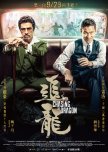
Chasing the Dragon
4 oamenii au considerat această recenzie utilă
Această recenzie poate conține spoilere
Chasing the Dragon depended on the star power of Andy Lau and Donnie Yen as the demonic duo of corrupt cop Lee Rock and triad leader Crippled Ho to carry it. While following the lives of the real-life criminal partners this film faltered by trying to portray them in a more noble light.The two characters meet when Ng Sik Ho and his crew are busted, and Lee Rock sees a use for them. During a particularly brutal gang fight filmed from above and on the ground, Ng is crippled saving Lee Rock's life, thus the nickname. The film shows the rise of the two in their fields and the deep comradery they developed. Eventually, suspicions and differing goals begin to chip away at their trust and friendship.
Ho and Rock are shown almost heroically at times. They are family men with deep loyalties to their people. Rock's system for organizing the gangs and doling out the money is praised for reducing gang wars. Crippled Ho shines with his loyalty to family and friends. The British were portrayed as OTP evil, with no redeeming qualities and the only reason corrupt cops and drug dealing triads existed. If there were no British there would be no need for corruption, triads, drugs and prostitution. What? Yes, the British rule was highly problematic, and I have no argument with them underlining those issues, but these two men were feeding on their own people dealing in heroin for Pete's sake. Ho and Rock were bad guys, not heroes. Lee Rock was known as the 500-million-dollar man for what he made off of the crime trade. Show their hatred for the British but also show the toll of their actions on their own people. Instead, director Wong Jing seemed to want us to empathize for them which I found incredulous.
Aside from portraying the leads as honorable without acknowledging their dark sides, the film lacked in character development for the side characters. When crew members are killed off, the camera lingers, the music swells, yet without a proper bonding with the characters those scenes left me unaffected. There are numerous deaths. While the movie isn't gory, the body count is high. Again, these are murderous drug dealers and very corrupt cops. Not going to feel sorry for any consequences they encounter.
Andy Lau plays the role he has done before, this time smooth and suave. Donnie Yen in a host of really bad wigs struggles more with a performance that should have been menacing yet didn't always come across that way. It didn't help for the first part of the movie he was playing a character much younger than himself. Kent Cheng showed up as Lau's sidekick without much to do. The women were briefly shown for window dressing.
The fights were well choreographed by Yuen Bun, Yan Hua, and Yu Kang. Though Yen is getting older he showed how to fend off several baddies with a coat! Many of the fights were gang against gang with constant action. The brawls tended to be more entertaining than the movie around them.
The draw of Yen and Lau is inexorable for their fans, of which I am one. The fights filled in the gaps between scenes, but much was missing from this tale of two charismatic criminals. Despite the fact these guys were corrupt, dealing in death and drugs nothing felt very ominous. Rendering them as almost folk heroes against the Brits felt disingenuous at best. Instead of Chasing the Dragon (looking for a heroine high) it felt more like Look at the Cute Lizards (can someone pass me a Tylenol?).
Considerați utilă această recenzie?
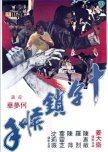
Shaolin Hand Lock
4 oamenii au considerat această recenzie utilă
Această recenzie poate conține spoilere
Shaolin Hand Lock is your classic Shaw Brothers kung fu flick. There's a secret deadly kung fu move, revenge, and a Big Bad with all sorts of nasty tricks up his sleeves and shoes in this case. I bumped my rating up .5 because of some of the lovely settings for the scenes shot on location in Thailand, also there was a nice twist at the end.David Chiang with a terrible hairdo played Li Cheng Ying and Chen Ping played his sister Li Meng Ping. Their father was murdered by an old business pal who was hiding more than secret weapons from them. Lo Lieh with a gray wig was the treacherous family friend. Michael Chan lucked out in a role that gave him slightly more to do than his usual hired hand/killer role in these movies. The cast worked hard to elevate a convoluted revenge theme even if they weren't always successful.
Li Cheng Ying traveled to Thailand to take out the assassin who killed his father but found that the man behind the killing was more formidable than he could take on face to face. He finagled his way into being hired as a guard setting himself up in a jealous rivalry for the boss' attention with Chan's Li Kun Shi. Normally, Lo Lieh played characters who were sharp, in this one he came across as fairly dense. At one point, after being attacked several times, he suspected Kun Shi attacked him wearing a bandana over his face when Michael Chan and David Chiang are not built remotely alike, and the assassin had that bad, bad haircut as well. Dude, you just hired the new guy, drew him into your confidence, and now you keep getting attacked when you are all alone? Wake up and smell the kung fu sweat.
The story was thin, but what reduced my entertainment value was Chiang's performance. He came across more as a gloaty bad guy and not an earnest son seeking revenge for the death of his father. Lo Lieh gave a performance he could give in his sleep and in a few scenes looked like he might have been sleep walking. Overall, the acting was satisfactory for this type of movie. There was the ubiquitous nude scene early in the movie, SB couldn't seem to help themselves with these. It wasn't necessary, but at least they used it to come full circle later. The women didn't have much to do, although Chen Ping did have one decent fight. Karen Yip gave an overwrought performance as a blind mother. Shum Lee Mei in her only film role had to play a character who changed sides on a dime, and holy Luke Skywalker/Princess Leia had an uncomfortable moment.
The studio settings were lackluster. What did sparkle were the walks, fights, and running through Thailand. There were also lots of boat chases in the canal. Lots. I guess they were one way to move things along even if it wasn't moving the plot along.
The fights were highly choreographed stopping short of kung fu posing with a little wire work added in. The final fight between the three men was brutal and creative.
Shaolin Hand Lock was an average kung fu movie wrapped in a beautiful Thai bow with a sharp little secret hidden beneath. If you enjoy old kung fu movies this one is watchable. As always, I grade these old niche movies on a curve.
Considerați utilă această recenzie?

Această recenzie poate conține spoilere
Love means having to say hello and good-bye and hello and good-bye...
As young children Zhao Yongyuan (Nicholas Tse) and Anran (Gao Yuan Yuan) both suffered tragic events after an earthquake. They met as children and we in Dramaland know what this means: D-E-S-T-I-N-Y. Though they are torn apart again and again, pass just close enough to each other without seeing the other, suffer through lack of communication and noble sacrifices galore, we as the viewers know such obstacles are no match for Destiny. Or is the evil F-A-T-E in control?Spoilery opinions will follow so reader beware...
Yongyuan lived with his grandmother as a child, barely able to afford clothes. Anran's father provided well for her. Through one act of kindness the two children become inseparable with Yongyuan always following Anran, a heavy-handed foreshadowing. Fate tears them apart for the first time. They are offered a second chance in their twenties and yet again fate thrusts them apart. Along with broken hearts, misunderstandings and noble sacrifice the two suffer alone on different continents. Amran goes to the United States as a graduate student to Columbia (daddy must have made really good money). Yongyuan goes to jail where he learns impeccable English and how to become an international trading mogul in one year. (None of which you see.) Beijing prisons must be awesome! Anran, all alone in the US, suffers a horrible tragedy that is glossed over quickly.
They collide in the United States during their 30's where the tables have been turned. Yongyuan is outrageously wealthy and Anran can't get a job anywhere with her measly graduate medical degree from Columbia. Apparently, Daddy must have spent all his money on her Columbia degree leaving her no inheritance. Oops! Spoiler! Well, the writing was on the wall when she left for the US and he gave her his watch that stopped when her mother died. That's okay because his death is dealt with in one sentence. She washes dishes as well as being a "tour guide" for a living. Her job as tour guide entails escorting wealthy clients in clothes they provide for her and going to dinner and a show. I'll stop with the spoilery plot developments except to say through minimal conversation and no honesty between the lovers they get back together and through one of the worst tropes in Dramaland and are torn apart...again. And then again...
I'll start with what I enjoyed. The first two times they were together when they were young were quite entertaining, even moving. Nicholas Tse and Gao Yuan Yuan were lovely to look at as their young adult and adult selves and the child actors who portrayed the young lovers/friends were cute as well. Veteran actor Lam Suet made a brief appearance as YY's uncle.
What didn't work for me: The tragedy upon tragedy with no time to process them, lack of any adult communication and honesty, the heavy-handed foreshadowing for just about all the tragedies, no subtlety involved including the overwrought OST, many of the tragedies and heartache happened offscreen so there was no way for me to connect or feel any empathy with their unseen pain, Yongyuan's ridiculously fast rise to super wealth, and the fact that he waits for her and follows her for over twenty years (not including all the childhood years). It was hard to feel any sympathy for characters who kept their feelings and secrets locked down tight. The love triangle with a childish and unlikeable character was unnecessary. The writer mistook characters suffering tragedies, many of which were off-screen, as character development and reasons for the viewer to feel sorry for them.
The actual camera shots of them wandering around, alone and forlorn in China and the US would have been lovely if they hadn't blown them out to the point the film looked like it was a faded forty-year-old movie. I get they might have been going for a gauzy romantic feel, but it didn't work for me, it was one more blurry barrier to connecting with these two. When the final tragedy struck, which again was foreshadowed in the opening scene, I felt nothing but relief that the film was almost over except that I had to sit through a propaganda announcement at the end.
I need somewhat coherent and consistent plot and character development and relationship development, But Always gave me none of that. This felt more like two people who wandered into each other's lives, messed everything up when Fate wasn't hurling everything she could at them from dead parents to national disaster after national disaster (think Remember Me with Rob Pattinson, if you liked this movie, you should try that one out). All the pain and angst felt manipulative by the writer and director instead of organic to the story. They could have cut the tragedies in half, developed the characters and their dialogue, given them more realistic reactions to each other and their tragic lives and the tsunami of suffering (they missed using a tsunami!) and these gorgeous cardboard characters could have come to life. I know this is an unpopular opinion on MDL because this movie hit a lot of people in the feels, but it missed the mark with me.
Considerați utilă această recenzie?

Această recenzie poate conține spoilere
A drowning man will clutch at straws...
Director Ozu tackles The Depression head on in Tokyo Chorus with his lead character and the man's family. Though a silent film, this quiet slice of life speaks volumes for the economic devastation of the time. The story follows a happy-go-lucky worker in a light-hearted manner with an undercurrent of tragedy.The film begins playfully at a college with the boys being led in a calisthenics drill with Okajima Shinji in the role of class clown much to the drill instructor's chagrin. Soon he is shown as being a dad of three children and working in an insurance office. It's the yearly bonus day and everyone is excited. His son has asked for a bike and Shinji has made a list of what he will buy for his family. As everyone is celebrating bonus day, an older colleague is fired just before retiring and garnering his pension. Shinji stands up for him and is fired, too.
His son throws a fit when his father doesn't come home with a bike and his wife scolds him for not keeping his word. She soon realizes what has happened and comes around and is supportive. This is a pleasant pattern throughout the movie. When the little family is faced with setbacks and challenges, they let themselves hurt for a minute and then do what needs to be done.
Shinji is thrown into the world of the unemployed, the Toyko Chorus, which is substantial, even for a college-educated man with good work experience. Jobs are either not available or he's deemed over-qualified. When the family suffers a mishap, their dire situation is made clear. Shinji takes a job handing out restaurant flyers for his old professor/drill instructor. His wife sees him and is devastated that others will know they have lost their social standing.
Aside from showing the effects of a tragically high unemployment rate, Ozu excels in bringing this family unit to life. The children bicker and throw tantrums like children do, even if the son could be a bit much at times. His wife, Tsuma, may suffer a brief moment of tears or despair but then faces reality and refuses to let her children or husband down by wallowing in them. Shinji's fun-loving smile is often present though watching him closely you see the cracks in his effervescent personality. He's a man willing to suffer a blow to his honor to protect and provide for his family. One poignant scene portrayed this perfectly. After Tsuma's kimonos had to be sold, the family is playing a game on the floor. The children are unaware of the financial and emotional situation assailing their parents and laughing and singing. The parents join in the game initially downcast but let the joyful moment overtake them and bond together.
This film is in dire need of someone lovingly restoring it. Much of it was faded or had salt and pepper pock marks. Though I have seen films in much worse shape from only the 1970's. The music was jaunty and carried the story along, even when not much was going on. Once fully immersed, spoken dialogue wasn't missed much. The actors perfectly portrayed their feelings without resorting to hamminess to show the meaning behind their actions.
In many ways, the film comes full circle at the end, with a wiser, sadder Shinji. This film is not perfect. The first half felt slow to me, barely making any progress. And then like a flower opening we see more sides to the characters as they work together believing things will get better. It was the love of this family that I enjoyed the most about this film. Tokyo Chorus was a sweet film of perseverance never letting itself be swallowed by melodrama. Ozu rarely disappoints, and for me, he didn't with this film either.
Considerați utilă această recenzie?

The Road I Travel with You
4 oamenii au considerat această recenzie utilă
Această recenzie poate conține spoilere
If the world is such a romantic place, why are things so difficult for us?
Money or romance? Social position or love? Family or lover? Hope or despair?The Road I Travel with You starts out like a romantic comedy/drama with lilting music driving the conversations. A retired geisha's sons have fallen in love with women above their station. The problem is that their mother has already started matchmaking for them and the young women in their hearts are out of reach due to their families' rejection of them. The young men are not so easily dissuaded when it comes to affairs of the heart. Neither is their mother dissuaded when it comes to their futures and money. What starts out with a hopeful beginning quickly turns dark.
The movie takes place mostly in living rooms with stiff acting and even more stilted dialogue. The film frames and cinematography are not particularly creative or interesting. Overall, this felt like a more clinical version of Romeo and Juliet. The young people are in love and can see nothing past this love. The parents are practical to a fault and want secure financial futures for their children even at the cost of the childrens' happiness. Emotions should have been boiling over, yet everyone remained eerily calm or in the case of the retired geisha completely detached from her sons' reality.
This movie could have been more emotional, more gut wrenching if everyone's feet didn't feel like they were nailed to the floor during scenes and if their emotions reflected the dialogue they spoke. At no point did the young men and women convince me of the depth of their love or despair, making the tragedies that would follow hollow and meaningless to me. I would never try to dissuade anyone from watching this romantic melodrama, but for my experience, this short movie clocking in at 1 hour 9 minutes felt more like 3 hours.
Considerați utilă această recenzie?
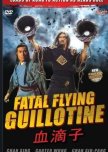
The Fatal Flying Guillotines
4 oamenii au considerat această recenzie utilă
Această recenzie poate conține spoilere
I was born to be cruel you fool!
Carter Wong gives mama’s boys a good name when he takes on Chen Sing’s flying guillotine wielding baddie. Decapitations and amputations come steadily at the hands of kung fu’s most bizarre weapon.The plot is thin and has numerous confusing plot developments, many never explained. The basic structure of the story is that Carter must go to the Shaolin monks to borrow a mystical healing handbook to save his ill mother's life. In order to gain access to it he has to fight his way through three levels of shaolin fighters. When he ultimately succeeds, he and the monks are betrayed. In order to retrieve their special book stolen by the 4th Prince who has grand ambitions they are set on a collision course with the master of the guillotines.
The guillotines and other secret weapons as well as hand to hand combat are employed to deadly ends. Some fight scenes are better than others, many including a healthy dose of wire-fu. Carter Wong wasn’t as stiff in this movie as he has been in some. Chen Sing always makes for a compelling bad guy, even in a bedraggled gray wig and beard.
The Fatal Flying Guillotines looked like it had been mostly remastered. Even at that there were scenes which went from clear and wide screen to grainy full screen images. The cinematography was pretty decent for the budget and era. Much of the fighting took place outside in some very nice scenery.
Guillotines kept the action going almost non-stop with double and triple crosses all in the name of gaining the knowledge of the spinning weapons. Many kung fu films suffer from an abrupt ending, and The Fatal Flying Guillotines was no exception, but not as bad as some. Overall, it was an entertaining 1970’s kung fu film, though maybe not the strongest of the guillotine movies.
Considerați utilă această recenzie?
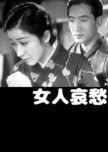
A Woman's Sorrows
4 oamenii au considerat această recenzie utilă
Această recenzie poate conține spoilere
Since I cannot marry someone I love, anyone will do
A Woman’s Sorrows sounds like a tragic film but instead it’s a movie about one woman’s self-discovery. Set in 1937 before WW II, some nascent progressive ideals about women’s place in the world and marriage were explored.Hiroko was a shop girl who came from a poor family. Described repeatedly as “conservative and indecisive” she found herself unable to marry the cousin she loved and decided any man her mother chose would be acceptable to marry. She ended up married to a man from a wealthy family but soon discovered she was little more than an unpaid servant and one who worked longer hours than the employed maid. When any task needed to be done “Hiroko” was the first word on the family’s lips. Her husband viewed her as a pretty doll to take out and look at occasionally when he wasn’t partying with his friends after work.
Her sister-in-law, Yoko, married for love, but her husband could not provide for her in the way she was accustomed, and she came home to her family. He refused to give up on Yoko creating conflict by using Hiroko as a messenger.
Both Hiroko and Yoko had to come to terms with what they wanted out of their lives and marriage. Both were bound by the patriarchal system and well-defined roles they were expected to follow even if some of the rules appeared to be bending. For instance, Hiroko’s conservatism was viewed as a mark against her when looking for a match. Her new family loved her submissiveness but did not respect her for it. Yoko, though refusing to become submissive like Hiroko, could not free herself from her perception of what marriage should be and was also trapped.
Hiroko slowly began to understand she was more independent than even she knew herself to be. I have never wanted to stand up and cheer for a Japanese film as I did for this one when Hiroko stood up for herself and her beliefs rejecting the emotionally unfulfilling life she had entered into. I found A Woman’s Sorrows to be surprisingly progressive for a 1937’s film on marriage bolstered by a satisfying ending. For anyone not put off by such an old film I could easily recommend it.
Considerați utilă această recenzie?
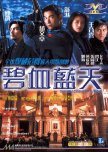
The Blacksheep Affair
4 oamenii au considerat această recenzie utilă
Această recenzie poate conține spoilere
My first inclination if you've found this movie page and are wondering whether to watch this movie is to say, "Run for your life!" or "Do not stop, do not pass go, put this directly into your NI list". But I will try to be slightly more objective than that because someone other than me may want to sit through this because they are a Shu Qi fan. Or perhaps a Vincent Zhao fan. Or you don't care how bad the acting and story are if you can watch some martial arts. Let's start with the story. Vincent Zhao's character is banished to the fictional country of Lavernia (right next to Shirleenia) for saving a plane full of passengers from a high jacker. Ostensibly it's because he didn't follow orders, but I think it's because he emptied an entire magazine into the bad guy and still didn't kill him. Lavernia is a former part of the Soviet Union and there are people sent in chanting they want to return to the USSR. A Japanese cult leader is in town blowing things up and killing people left and right in his desire for a new world order. There's a boat load of Chinese refugees offshore that are starving to death. Oh, and the Minister of Defense is on the take and a gun runner and also in cahoots with the deadly cult leader. Throw into this mix, Shu Qi's character who fled China after being a witness to the violence and carnage in and around Tiananmen Square and is also Zhao's ex-girlfriend and you have one convoluted piece of work.
The propaganda is heavy handed in this film. Shu Qi's character is berated by Zhou's character and just about everybody else throughout the movie for leaving the homeland after witnessing people wounded and dying when the protesters were crushed.
Zhou is a good kicker, but his acting felt bland to me. Even at that it was much better than the rest of the male cast. Shu Qi didn't have much to do but play the pretty damsel in distress. Andrew Lin made the most of his crazed messianic villain. His character seemed especially impervious to bullets, especially after his initial capture when his rescuers sprayed the area with bullets attempting to take out his guards.
There were places in the movie so bad I was laughing but it was hard to keep it up as the ridiculousness of the scenes dragged on. Some of the fights were good, others relied heavily on wire-fu and defying the laws of gravity. I don't mind a little wire-fu outside of fantasy movies, but in a more reality-based story it seemed badly out of place.
The movie ended with an over-wrought climax that had me begging for the final credits. The most positive thing I can say is that the movie is mercifully only 90 minutes long.
Considerați utilă această recenzie?
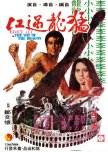
Way of the Dragon
4 oamenii au considerat această recenzie utilă
Această recenzie poate conține spoilere
Bruce Lee wrote, directed and starred in Way of the Dragon, taking the crew to Rome to film among the Coliseum ruins. Way of the Dragon begins as more of a comedic story with Bruce as the fish out of water in Rome trying to help with a family business. Nora Miao's restaurant is under attack from a developer who wants her to sell. Bruce's character plays the unstoppable force who can take on an entire army of bad guys. Ultimately, the Big Bad calls in Chuck Norris to rid him of the troublesome new guy.
I found the first half of the movie less than enthralling. Much of it was supposed to be funny but I didn't get the humor, especially a long running gag with Bruce having gastrointestinal distress.
The second half of the movie is pure martial arts magic. Some versions cut out a scene with Bruce taking on a group of thugs with not one set of, but two sets of nunchucks. It also shows why amateurs should not try those tricks at home, which was really funny. The climax of the movie with Bruce fighting Chuck Norris is a classic. Chuck was a legitimate and respected karate champion. Bruce wanted someone who could keep up with him and the fight was highly entertaining. Bruce asked Chuck to gain some weight to make him look more formidable and it would seem to not shave his back hair (chest hair was considered sexy in the 1970's). A cat watching the events played out some of the emotions of the two fighters and the audience.
Bruce Lee was artistry to watch, when he slowed down enough for us to catch even a fraction of his moves. Despite my disappointment with some elements of this film, no actor had a better "I'm through playing around now" look than Bruce had. His intensity was smoldering. The fights in the second half of the movie ran the gamut from fun to tense, to enthralling. If you enjoy martial arts movies, and haven't seen this one, you need to put it on your list. The classic fights in it are not to be missed.
Considerați utilă această recenzie?
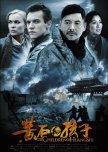
The Children of Huang Shi
4 oamenii au considerat această recenzie utilă
Această recenzie poate conține spoilere
In a small city on the Mongolian border in China stands a statue of an Englishman. Unlike so many white savior stories, The Children of Huang Chi is based on the real life of George A. Hogg, an Oxford graduate in economics who ended up leading 60 war orphans safely to Shanshan 700 miles/1000km from where they started in Huang Chi. Writer James MacManus visited the town and interviewed survivors making the basis for this film.George Hogg was played by Jonathan Rhys Meyers with more or less success. For me, he is an acquired taste. Hogg was a reporter stuck in Shanghai away from the action. He managed to make it into Nanjing masquerading as a Red Cross driver. He got there in time for the massacre and ended up nearly being killed for taking pictures of the atrocities. He was rescued by a communist guerrilla, Chen Han Sheng, played by the charismatic Chow Yun Fat. West Point educated in engineering, Chen was very good at blowing things up. When Hogg is injured, an American nurse, Lee Pearson, played by Radha Mitchell, suggested Chen send him to Huang Chi to recover, learn some Chinese and take charge of 60 orphans hiding out there.
What Hogg found when he arrived in Huang Chi were 60 boys, malnourished, suffering from various diseases, and barely sheltered. Devastated from the loss of their families, they did not welcome Hogg with open arms. He was just another foreigner. Hogg wasn't thrilled to be there either. With some encouragement from Lee and few other prospects available, Hogg began slowly improving conditions at the estate and winning the boys' trust. As the boys healed, they were faced with one of two eventualities-the Japanese who were nearing the estate would practice their scorched earth policy on them of Kill All, Burn All and Loot All which the boys had already survived once. Or, one of the Chinese armies would conscript the young boys to fight. At this point Hogg knew he needed to take the boys as far north as he could. With the help of Lee and Chen they began the boys' long journey through dangerous territory to the Gobi Desert.
As a co-production of China, all the characters were on equal footing. This wasn't a story about a heroic white guy who saved China. It was the human story of a man who saw the needs of 60 boys and stepped up and did what was necessary, what was right, as did the other characters trying to help them and survive the invading Japanese armies. More meaningful than even the movie, were the interviews during the credits with the real-life boys, now old men, Hogg helped.
The scenery and cinematography were beautiful. The stunning shots of the mountains, lakes, and desert were suitable for framing. Though understated the score fit the scenes perfectly.
Even though the film touches on the atrocities committed on the Chinese civilians, this is not an action movie or thriller. It's a story of courage and love, of building relationships and family. It's a story of love for the children who had suffered and seen more than anyone should have to. It's a story of how people stepped up and put their lives on the line for those children. At its heart, The Children of Huang Chi, like the statue erected in his honor, was a love story to George Hogg and the devotion he had for children not his own.
Considerați utilă această recenzie?
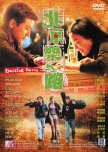
Această recenzie poate conține spoilere
Beijing Rocks follows the lives of what amount to be poor, itinerant musicians hoping for their big break as long as they don't have to change who they are. Daniel Wu played Michael, a wealthy Hong Kong musician, whose money came more from his father than any money he made in the Hong Kong Music industry. Awaiting trial on an assault charge he traveled to Beijing to learn Mandarin and finish a song he was working on. He quickly fell in with an underground rock band led by Road (Geng Le) and his free-spirited girlfriend Yang Ying (Shu Qi).
Beijing Rocks see-sawed between shots of vibrant, loud night scenes and ordinary daytime markets. The rockers went on a road trip or hole hopping where they traveled and then put up a tent to bring on the noise. Road was a character who could be hard to like. He was talented but sabotaged every shot the band got, cheated on his girlfriend and ran away at the sign of trouble. Shu Qi brought the thankless role of the devoted girlfriend to life and the movie lacked spark when she was not on the screen. At first glance she appeared to be a party girl, but Yang Ying's effervescence belied her darker thoughts. Michael, a fairly bland character, acted much like our window into the world Road and Yang Ying navigated that was on the thin boundary of poverty and fell into violence occasionally. The tipping point for Road and where his path slipped into melodrama was when he realized the record companies wanted obedient rockers who only acted rebellious, not actual independent minded rockers.
For me, the rock music, especially at the beginning was high school garage band at best. Near the end I actually enjoyed the song Good Night Beijing. Or maybe I had finally fallen into the rhythm of this quirky film.
Whether you think this movie rock and or rolls may be determined by how much you fall in love with Shu Qi and this flowing narrative of rebellious rockers.
Considerați utilă această recenzie?

Only Cloud Knows
4 oamenii au considerat această recenzie utilă
The story begins with a man who had lost his wife revisiting places she loved with her ashes. Throughout the movie as he met people, he told them about different parts of their relationship in sweeping flashback. There was nothing extraordinary about this devoted couple, but it was their devotion to each other through the years that made it meaningful.
Both characters, originally from Beijing, met in New Zealand and worked to find their way in their new country. They assimilated fairly easily, making good friends and starting their own business. However, Luo Yun, the wife, quietly struggled with their idyllic life in a remote town where they ran a small restaurant. Sui Dong Feng, the husband, was the practical sort who found the best in whatever situation he was in. Yang Cai Yu and Huang Xuan had a gentle chemistry that made something magical out of their characters' ordinary existence.
New Zealand should have been listed as a character as there were many shots of its gorgeous scenery, whether green bucolic fields, panoramic mountains, the Southern Lights or oceanic whale watching shots.
The OST was also saccharinely emotional, but fit the mood perfectly. The cinematography bestowed lush, warm shots, nestling us into the embrace of Yun and Dong Feng's life. I could almost feel the director pushing me toward tears, something I usually fight off. Instead of rolling my eyes, I found myself reaching for a tissue at several key moments. If the story was predictable, it also felt sincere in the lavish telling of this couple's love story.
Though dealing with the death of a loved one, Only Cloud Knows avoided melodrama and became a celebration of life and love instead.
Considerați utilă această recenzie?
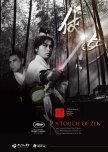
The movie opened with a spider spinning her web. Political intrigue and battle strategy were woven throughout, complex and yet fragile. This three hour movie was divided into three segments. The first focused on Ku Shen Chai, an underachieving scholar and painter and his relationship with his mother. She harangued him for his lack of ambition and single status almost constantly. Strangers began wandering into town, including Hsu Feng's Yang Hui Ching bringing with them danger and subterfuge. The second segment turned into a battle between a large troop of government troops against a small band of rebels. Ku's knowledge and battle trickery came into play as his character evolved. The third segment moved into the spiritual realm as the monks sought to have both the good guys and bad guys move beyond the temporary conflict to peace.
ATZ was unusual for a martial arts movie, the fights didn't begin until after the first hour. The movie wasn't structured around the fights, the fights were used to enhance the story being told. The cinematography, sets, scenery, and costumes were extraordinary for a 1971 Taiwan martial arts movie. Hsu Feng had helped fund the restoration of this film and for that we should all be grateful. Clear, vibrant, lush, it was a treat for the eyes. King Hu's camera direction caused the viewer to ever look upward as the film progressed, symbolic for the message being woven throughout. His fight set among the bamboo inspired later films such as House of Flying Daggers.
Hsu Feng's character was a woman who spoke few words, preferring to let her blades do the talking. Wanted by the current corrupt regime, she was aided by two disgraced generals. They had hoped to find peace far away from the palace only to have trouble and death follow them. Hsu gave a quiet, yet memorable performance. Pai Ying 's General Shih also moved through the world with little to say. Only Ku and his mother chattering about gave the film a verbal foundation to stand upon. I enjoyed all the performances with the possible exception of Shih Chun's Ku. He seemed out of place with the other actors but perhaps that was the point. His character certainly evolved the most and showed that even someone without kung fu skills could still be beneficial in times of need. Lastly, Roy Chiao's performance as a Buddhist monk still connected enough to worldly events to aid those fleeing evil and spiritual enough to care about the evil doers was quite good.
Though clocking in at three hours long, A Touch of Zen kept my attention throughout. I could easily recommend this beautifully shot movie to martial arts movie enthusiasts and those who can look past a few dated performances and special effects to see the hidden gem lying beneath.
Considerați utilă această recenzie?

 54
54 191
191 11
11






















